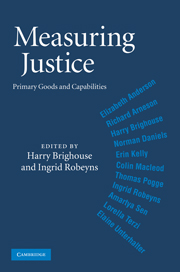Book contents
- Frontmatter
- Contents
- List of contributors
- Acknowledgments
- 1 Introduction: Social primary goods and capabilities as metrics of justice
- PART I THEORY
- PART II APPLICATIONS
- 6 Capabilities, opportunity, and health
- 7 What metric of justice for disabled people? Capability and disability
- 8 Primary goods, capabilities, and children
- 9 Education for primary goods or for capabilities?
- 10 Gender and the metric of justice
- PART III CONCLUDING ESSAY
- Index
- References
8 - Primary goods, capabilities, and children
Published online by Cambridge University Press: 05 June 2012
- Frontmatter
- Contents
- List of contributors
- Acknowledgments
- 1 Introduction: Social primary goods and capabilities as metrics of justice
- PART I THEORY
- PART II APPLICATIONS
- 6 Capabilities, opportunity, and health
- 7 What metric of justice for disabled people? Capability and disability
- 8 Primary goods, capabilities, and children
- 9 Education for primary goods or for capabilities?
- 10 Gender and the metric of justice
- PART III CONCLUDING ESSAY
- Index
- References
Summary
The debate between advocates of a primary-goods focused approach to justice and advocates of a capabilities focused approach has been conducted without much explicit attention to how the perspective of children should be represented and interpreted. The objective of this paper is to make some modest progress toward remedying this neglect. The principal conclusion I reach is that neither the Rawlsian primary goods approach nor the capabilities approach provides a fully satisfactory theoretical framework for addressing the full range of children's interests with which justice should be concerned. Moreover, the shortcomings of both approaches are located, I suggest, in a common implicit assumption, namely that the human beings with whom justice is concerned are to be conceived primarily as either mature agents capable of assuming responsibility for the ends they adopt and pursue or as potential mature agents. I will argue that children do not comfortably fit the paradigm of agency that plays an animating role in both theories. Although my main aim is to provide a diagnosis of the theoretical limitations of both approaches, I will offer some tentative remarks about what fuller sensitivity to all the relevant interests of children might involve.
The analysis I develop highlights limitations that I believe can be detected in both views but I do not want the critical focus of the paper to be interpreted as entailing a wholesale rejection of either Rawlsian theory or the capabilities approach.
Keywords
- Type
- Chapter
- Information
- Measuring JusticePrimary Goods and Capabilities, pp. 174 - 192Publisher: Cambridge University PressPrint publication year: 2010
References
- 67
- Cited by

